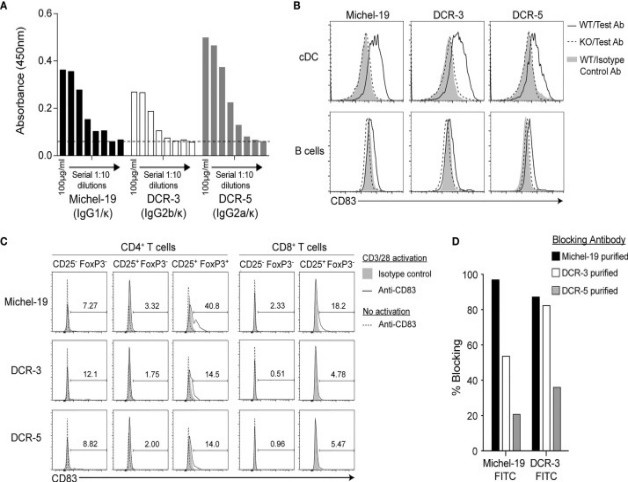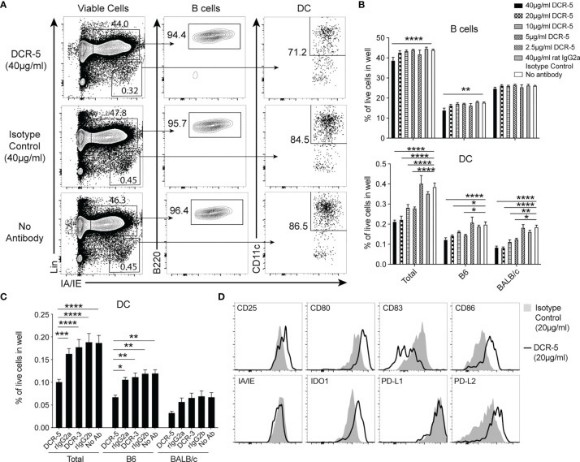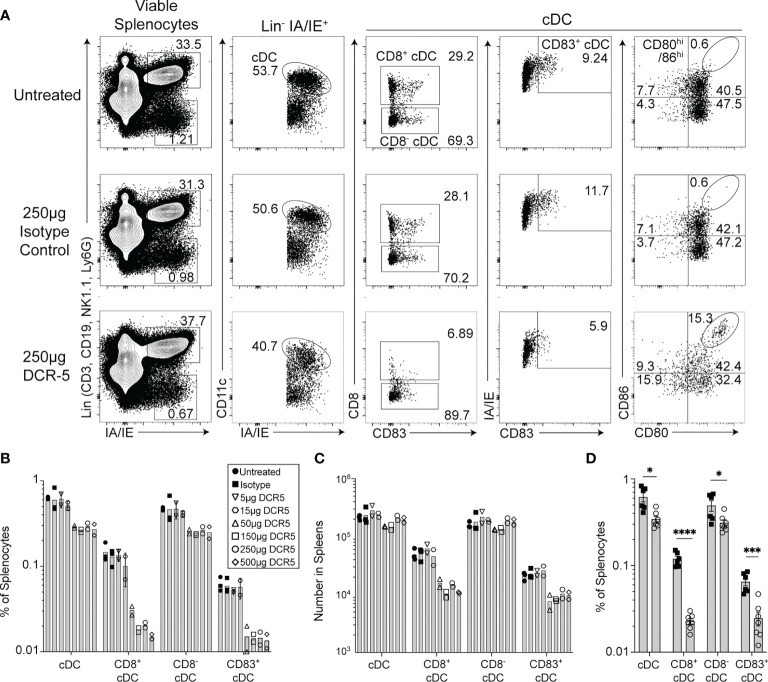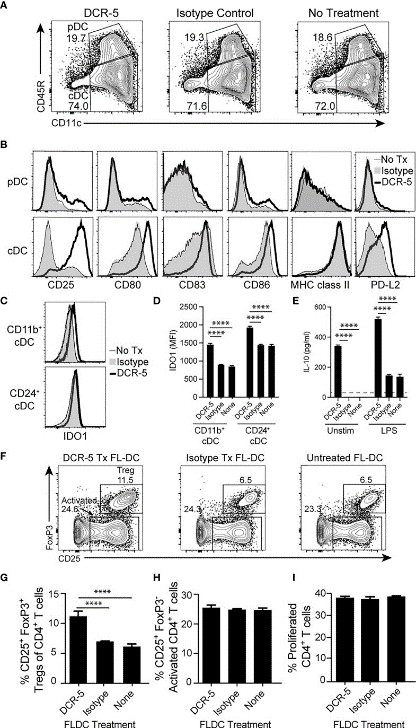CD83 is an Ig superfamily molecule that highly expresses on the surface of mature DC. Anti-CD83 antibodies have been shown to preserve heterologous antiviral and antitumor T cell responses while leaving heterologous Tregs or immature DC that enhance self-tolerance unaffected. Researchers have developed a rat anti-mouse CD83 monoclonal antibody (mAb) that mimics the properties of our human anti-human CD83 therapeutic 3C12C. As an expert specializing in monoclonal mouse antibody production, Creative Biolabs provides services related to antibody stability improvement and antibody humanization, thus facilitating the development of efficient antibody-based treatments for human diseases.
Dendritic cells (DCs) are a rare heterogeneous immune population that can be roughly divided into conventional (c) and plasmacytoid (p) DC subsets. These cells are constantly checking for antigens in their tissue environment. Antigens are internalized, processed, and transported by DCs to lymphoid organs, where they are presented to T cells as peptides by major histocompatibility complex (MHC) molecules. In response to antigens accompanied by inflammatory cytokines or danger signals that trigger pattern recognition receptors, DCs undergo maturation. This leads to the upregulation of cytokine and chemokine secretion and surface coreceptors required for activation of specific T cell responses. In the absence of danger signals or inflammatory cytokines, antigen presentation by immature DC induces T-cell tolerance through mechanisms such as absence, anergy, or induction of regulatory T cells (Tregs). Alternatively, DC is guided to mature into a regulatory state that actively induces T cell tolerance (termed DCreg) through signaling by anti-inflammatory cytokines such as IL-10, homeostatic signaling by vitamin D, or reverse signaling by the costimulatory receptor CD80/86. Dysregulated DC maturation that presents self-antigens or ineffective induction of DCreg can lead to the activation of autoreactive T cells, such as autoimmune diseases.
Rheumatoid arthritis (RA), a systemic autoimmune disease causes inflammation, pain, and eventually joint function loss. Although the commonplace and efficacy of the targeted therapies with limited immune suppression, therapies targeting novel pathways involved in the initiation of the immune response, such as antigen presentation, hold promise for arresting disease at earlier stages. Collagen-induced arthritis (CIA) is a disease model driven by mature dendritic cells in lymphoid organs and synovial fluid that initiate autoreactive T and B cell responses through antigen presentation and concurrent secretion of inflammatory cytokines and chemokines. In a mouse model with arthritis, adoptively transferred dendritic cells inhibit T and B cell activation by inducing regulatory T cells (Tregs), a mechanism that has been translated into human clinical trials. Antibodies targeting mature DC in situ are a potential strategy for the treatment of RA.
Using hybridoma technology, two monoclonal antibodies against mouse CD83 were developed, named DCR-3 (IgG2b/κ isotype) and DCR-5 (IgG2a/κ) The binding properties of rat anti-mouse CD83 monoclonal antibodies were determined through flow cytometry.
 Fig 1. Binding properties of rat anti-mouse CD83 antibodies DCR-5 and DCR-3. (Silveira, P. A., et al., 2022)
Fig 1. Binding properties of rat anti-mouse CD83 antibodies DCR-5 and DCR-3. (Silveira, P. A., et al., 2022)
To determine the functional activity of DCR-3 and DCR-5, their effects on activated APC and allogeneic T cell proliferation were examined when added to the MLR between B6 and BALB/c splenocytes. The results showed that DCR-5 depletes CD83+ conventional (c)DC, induces DCreg, and inhibits CD4+ T cell proliferation in MLR assays. However, DCR-3 showed no significant activity.
 Fig 2. DCR-5 depletes and alters DC phenotype in vitro. (Silveira, P. A., et al., 2022)
Fig 2. DCR-5 depletes and alters DC phenotype in vitro. (Silveira, P. A., et al., 2022)
DC in vivo targeting of DCR-5 was examined through flow cytometric analysis of spleens from DCR-5-injected mice. The results showed that in vivo DCR-5 administration reduces CD83 DC and induces DCreg and Treg in mice+.
 Fig 3. In vivo treatment of mice with DCR-5 results in depletion of DC. (Silveira, P. A., et al., 2022)
Fig 3. In vivo treatment of mice with DCR-5 results in depletion of DC. (Silveira, P. A., et al., 2022)
To examine whether the binding of DCR-5 to CD83 on DCS was sufficient to induce a DCreg phenotype in the absence of other immune cells mediating cytotoxicity, investigators isolated bone marrow samples from B6 (consisting of >90% cDC and pDC) and generated an FL-DC population.
 Fig 4. DCR-5 binding to FL-DC population induces DCReg. (Silveira, P. A., et al., 2022)
Fig 4. DCR-5 binding to FL-DC population induces DCReg. (Silveira, P. A., et al., 2022)
Reference
All listed services and products are For Research Use Only. Do Not use in any diagnostic or therapeutic applications.